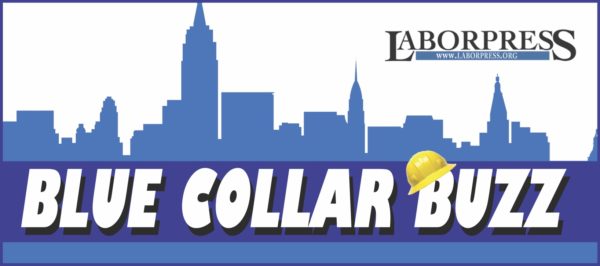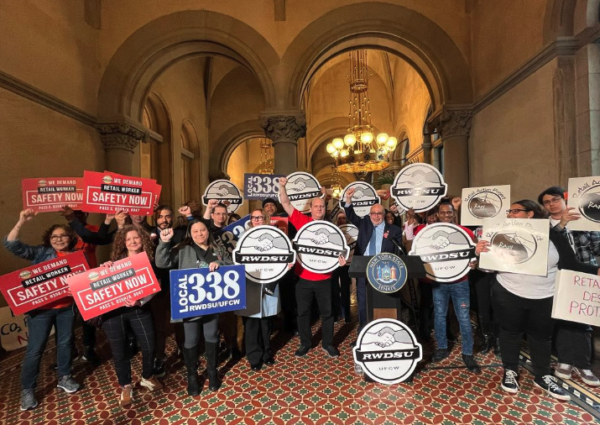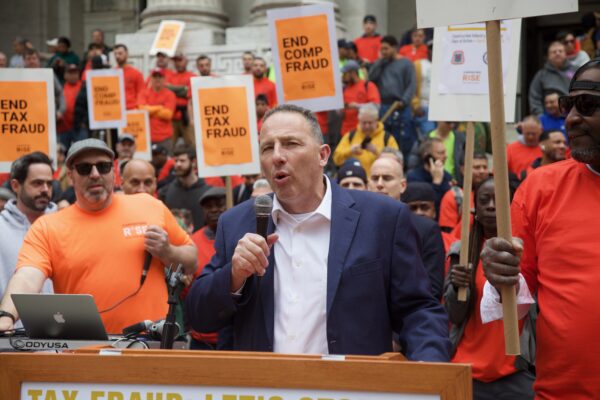New York, NY – This week’s episode of Blue Collar Buzz finds Democratic-Socialist Lee Carter going in depth about how he defied  conventional expectations and won a seat in Virginia’s House of Delegates as part of November 7’s larger “blue wave” of progressive victories across the country.
conventional expectations and won a seat in Virginia’s House of Delegates as part of November 7’s larger “blue wave” of progressive victories across the country.
“Our campaign was able to put together a coalition of the Democratic base with the Democratic-Socialists…we did that in defiance of Democratic Party leadership,” the 30-year-old former Marine tells Blue Collar Buzz. “One of the first conversations that I had with the state party…they told me…you can be as far left as you want — but you’re going to lose.”
Lee, of course, didn’t lose. And one of the reasons he was able to secure a victory is because he had the support of organized labor.
“My relationship with the unions was great,” Carter says on this week’s episode. “I think that they were a little skeptical as to whether a DSA member would actually be able to get elected. But looking back when unions were the strongest — they were as strong as they were because they had this coalition: traditional trade unions and more radical unions; there were Democrats that supported unions, there were Socialists who were actually in office. So, basically, we’re getting the band back together.”
Mobilizing wider labor support for truly progressive pro-worker candidates like Carter would be a lot easier if there were an alternative to the constant din of big-money, corporate media outlets. Like LaborPress itself, Union Members Radio broadcasting live out of Detroit on Sunday nights from 7-9p.m. (WDTK 101.5 FM and 1400 AM), has dedicated itself to bringing the voices of working men and women to the forefront. And they’ve been consistently winning over converts in the process.
“We get to folks that normally don’t hear our point of view because we’re on a conservative radio station,” Union Members Radio Host James Dennis, tells Blue Collar Buzz. “And, believe it or not, we got a lot of flak from some of our union brothers and sisters because we were on a conservative radio station. To them, we shouldn’t help that station to thrive. We’re like…we’re not. What we’re doing is, we’re talking to people who normally don’t think like we do.”
Dr. Marick Masters, labor studies academic and Union Members Radio co-host, explains it this way: “The audiences that I teach and speak to are not generally receptive to the union message. But what I’ve found, is they are the audience I need to reach because they are very uninformed about the role of labor. And once you begin to peel the onion a little bit and get beyond their initial hostile or adverse reaction to unions — and they start thinking — they’re more receptive. You can preach to the choir until you’re blue in the face — but that won’t move the movement forward.”
And with the right-wing assault on the American worker continuing practically unabated, the need to move the movement forward has never been more urgent.
This week, Labor law expert and LaborPress columnist Alexander Schmidt talks about the forced arbitration case now before the United States Supreme Court and the disastrous impact it will have on the American worker should the justices rule against them.
“Forced arbitration is a way that employers deprive their employees of the opportunity to litigate disputes against the employers in a court of law,” Schmidt explains. “They have form contracts, they make it a condition of either getting a job, or, in many cases, even keeping your job. You have to sign away your right to sue your employer in court. If you have a gripe against your employer, your’e forced to litigate that gripe alone — even if the employer is doing the same thing to thousands of other employees.”
From 9/11 to today, when disaster has darkened America’s door, trade unionists have been there on the front lines lending aid and relief. The devastation in hurricane-torn Puerto Rico is no exception. This week, we get another first-hand account of relief efforts in Puerto Rico with Teamsters Local 210 crane operator Jessica Yance.
“When I got there, I felt like we were, honestly, the only ones doing anything [to help],” Yance tells Blue Collar Buzz. “I saw FEMA, but they were doing a lot of paperwork with the people of Puerto Rico; we were actually working for the people of Puerto Rico. We went door-to-door. I didn’t see people working on electricity, I didn’t see people working on the roads or anything like that. I feel like the Teamsters started that movement over there.”
Listen to the full episode below:



